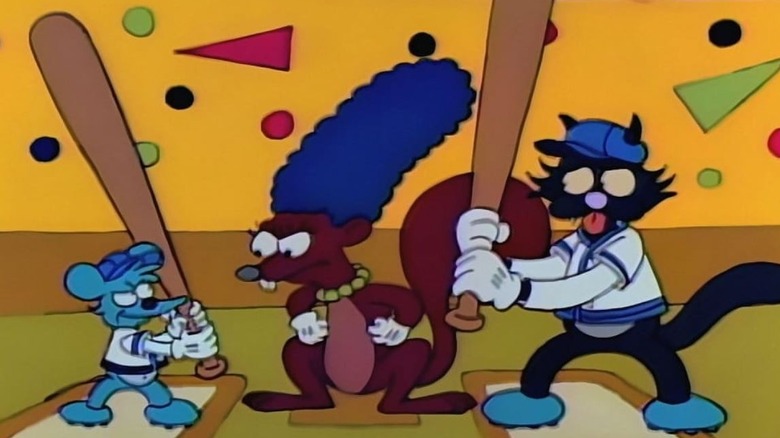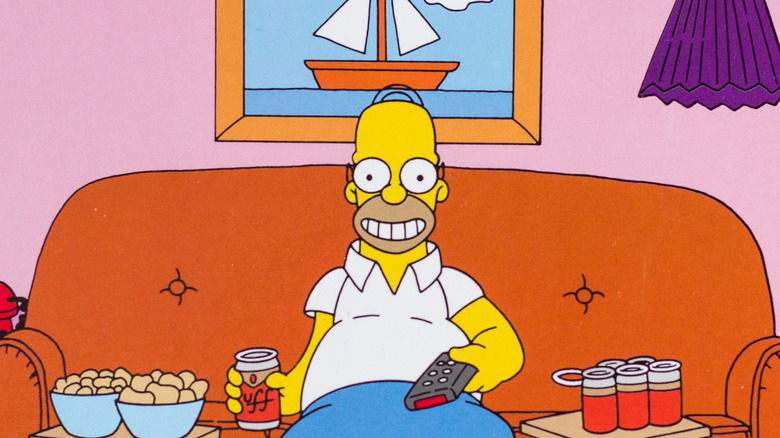Multitasking Is The Most Complicated Part About Being A Writer For The Simpsons
With 700-plus episodes and counting, "The Simpsons" has long dominated Fox — and worldwide television in general — since 1989. There's something about these animated characters that continue to enchant lifelong fans who have been there ever since Bart tried to get himself a "MOTHER" tattoo.
The behind-the-scenes process looks different than it did back then; animation has evolved with improved technology and fans see the change as they watch season to season. Drawing the characters, embracing a style book, and replicating characters frame by frame in 1989 was no picnic; the drawing style has been called "deceptively simple" by artists on the show.
But the plots still resonate, as they did in 1989, as the writers are eager to keep up with current happenings. Laughter is still the main goal. In a recent interview, Matt Selman, the show's current executive producer, put it this way: "Every episode is unique and distinct and has something to say." At the core, Bart is still rebellious, Lisa still is hopeful, Maggie is still a baby and Marge still strives to be the perfect homemaker and wife, even throughout Homer's blunderings. To reiterate: not much has changed, least of all the writing; the intrinsic flow of the writing process born in 1989 continues to make "The Simpsons" tick in 2022.
Well, not according to John Swartzwelder, one of the original writers. In his first major interview, Swartzwelder told The New Yorker in 2021 that writing for "The Simpsons" is a walk in the park compared to how things were early on.
How was the writing room back in the early years?
And he may be correct. Traveling back in time will allow us to understand why John Swartzwelder thinks that way. Swartzwelder joined "The Simpsons" in 1989. With 14 seasons and almost 60 episodes to his credit, he is revered for his comedic contributions to the show and knows firsthand about the early processes.
During the show's early years, the group of writers would each write an episode, and together would take turns reading through each script, Swartzwelder told The New Yorker. While reading it out loud, the group would gauge the humor of the storyline, ultimately offering suggestions to improve it. Some lines were taken out completely, some scenes were scrapped. The initial draft would morph under the hands of all the writers. And then when they were satisfied, it would reach the cast members.
After enduring a table read, voice actors would offer feedback. If the dialogue was said naturally, if it garnered a laugh from everyone at the table, it would stick. A rule of thumb was that if 25% of a writer's original script passed everything, then it was a good script. It would take five to seven days for an initial rewrite, and sometimes scripts were rewritten more than once.
The complication lies in the need for multitasking. Each "Simpsons" episode takes between six to eight months to create from start to finish, involving writing, rewriting, animation, recording, etc. And writers are tackling more than one episode at once — perhaps six to eight episodes at once are being worked and reworked to finish a complete season.
Multitasking: The real challenge?
Working as an early writer on "The Simpsons" sounds fun and daunting. John Swartzwelder remarked to The New Yorker that scriptwriting and editing itself was fun. Tackling multiple storylines? Not so much. Assume current writers on "The Simpsons" such as Matt Selman haven't changed their process. If that's true, is multitasking the only complication?
While multitasking is certainly complicated, some may argue there's a bigger enemy: living up to the magic of their predecessors. And though it was difficult for Swartzwelder and that team of writers at the beginning, they had an advantage that current writers don't enjoy: the freedom from pressure.
In 1989, no one knew how well "The Simpsons" would do. Jay Kogen, one of the early writers, said his father tried to deter him from pursuing the job, claiming it would ruin his career. Like Kogen's father, most writers thought "The Simpsons" would be a complete failure. So, they decided to write it for themselves. The early writers had fun without having to deal with the pressure of expectations and created what they wanted because they thought it wouldn't matter anyway. And because people did and still want to, there's pressure nowadays.
"The Simpsons" is credited with being the first show that acknowledged the writers weaving these storyboards together. This is a blessing and a curse, and with credit, comes an expectation. Meeting everyone's expectations isn't possible but that doesn't make the action of trying any easier. That's a bit harder than a little multitasking, we'd say.


